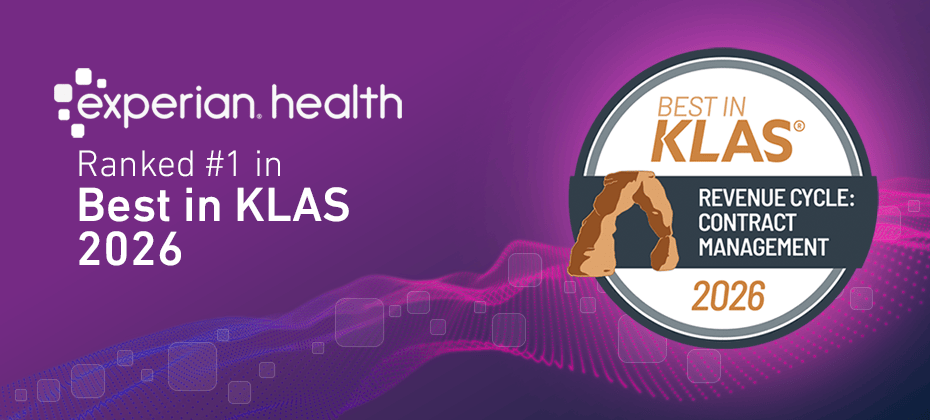
Many healthcare providers believe pairing “revenue cycle” with a qualifier like “predictable” is an oxymoron. From healthcare staffing shortages that slow down reimbursement tasks to increasing payer denials, financial regularity can seem like an unattainable goal for these organizations. The American Hospital Association (AHA) reports over one-half of U.S. hospitals had financial losses in 2022. Another AHA survey shows that 84% of these organizations say the cost of complying with complicated payer policies is climbing.
Providers throw an excessive amount of time and staff at chasing revenue, but reimbursement complexities make for anything but smooth financial sailing. How can healthcare providers even out the ebbs and flows of the revenue cycle? Experian Health’s suite of revenue cycle management (RCM) solutions can help.
Revenue cycle predictability during the life of a claim
When it comes to finances, U.S. healthcare providers rarely have an easy go of it. Today, the average life of a claim is anything but average. From registration to collections, hospitals established a new normal over the past decade: Widening gaps between service delivery and reimbursement. How can providers tackle this untenable situation? The answer is two-fold: with technology and at each stage of the life of a claim.
Here are three ways healthcare providers can use technology to create reimbursement predictability at each stage of a claim’s life.
1. Establish payment accountability at patient registration with price transparency
Reimbursement problems begin at patient registration. Healthcare price transparency demands patients understand the cost of care. According to Experian Health’s State of Patient Access survey, 81% of patients agreed that an accurate estimate helps them better prepare to pay for their care costs. However, only 31% of patients received a cost estimate before care.
There are three significant impacts of this troubling trend:
- Nearly 40% of patients say they put off needed care due to cost. The number rises to 61% if the patient is uninsured.
- Patients can’t afford to pay for needed care. Currently, 41% of U.S. adults have medical debt. An Experian Health study showed four in 10 patients spend more than they can afford on healthcare treatment.
- Uncompensated care causes a significant drop in healthcare provider income, which has amounted to almost $745 billion, according to the AHA.
Experian Health offers several data-driven solutions to improve price transparency. These tools make it easier for patients to handle their financial responsibilities while helping providers find solutions to help ease their burdens.
Patient Financial Advisor creates more accurate service estimates for patients before their procedure. The mobile-first platform offers patients a detailed cost breakdown on their preferred digital device.
Patient Estimates is a web-based platform offering real-time service estimates. Blessing Health System uses the tool to provide patient estimates that are up to 90% accurate. The provider increased collections by 58% and credits the software with a 1,200% return on their investment.
Patient Access Curator automatically initiates communication with payers to improve coordination of benefits and maximize return. It also automatically identifies missing or incorrect Medicare Beneficiary Identifier (MBI) numbers or errors in patient contact details. This solution also helps providers understand the patient’s ability and propensity to pay, allowing these organizations to predict revenue streams after service delivery.
Behind the scenes, Experian Health also automates insurance eligibility verification to unlock hidden reimbursements. This software roadmaps the correct coverage, connects to more than 900 payers and verifies insurance coverage at the time of service to improve cash flow and ease patient payment burdens.
2. Reduce claim denials by decreasing manual paperwork errors
Claim denials are one of the biggest impediments to revenue cycle predictability. Providers are stuck in an endless cycle of inaccurate payer submissions, rejected claims, and rebilling, creating a chaotic chase for payment long after the service.
Today, 35% of healthcare organizations report $50 million or higher in lost revenue due to claims denials. Even worse, Experian Health’s State of Claims 2022 report showed that 30% of providers say denials are increasing by up to 15%. According to that data, the top three reasons for claim denials are:
- Missing or incomplete prior authorizations.
- Failure to verify provider eligibility.
- Coding inaccuracies.
Experian Health’s Claim Scrubber software levels out provider cash flow, creating predictability amidst the chaos. The solution reviews complete claims for errors, generating actionable edits before submission. Claim Scrubber also reviews approved reimbursement rates to prevent undercharging. Transactions process within three seconds and providers reduce the need to rework claims.
Experian Health’s AI Advantage solution uses the power of artificial intelligence (AI) to evaluate every claim for its propensity to turn into a denial. Instead of submitting claims and hoping the payer will accept them, this solution takes the guesswork out of reimbursement for a more rational, predictable process. The software automatically scans for payer updates to reimbursement requirements that significantly contribute to claims denials. Hospitals like Schneck Medical Center use this tool to streamline the revenue cycle by preventing denials. After just six months, the provider’s denied claims reduced by an average of 4.6% each month. Claim corrections that took up to 15 minutes manually are now processed in less than five.
3. Increase collections efficiency with automation
Patients trust their healthcare providers to take care of them. Providers also rely on patients to pay their bills. It’s a mutually beneficial arrangement. However, it’s also a problem forcing providers to walk a delicate tightrope between caring for a sick patient while still chasing payment for their services. Unfortunately, the increasing cost of healthcare leaves patients on the hook for more than $88 billion in debt. The volume of healthcare payments in arrears is staggering, causing a substantial drain on provider cash on hand.
However, technology offers healthcare providers a way to improve the patient collections process. For example, Coverage Discoveryimpacts the revenue cycle at every stage of the claim:
- Before providing care, the software scans patient data to determine reimbursement coverage options from Medicaid, Medicare, and commercial insurance.
- It scans for active insurance 30, 60, and 90 days after care delivery.
- The tool scans patient data before determining whether the account moves to bad debt collections.
A more robust understanding of patient payment options at every stage of claims management allows healthcare providers to forecast reimbursements more accurately, increasing the predictability of the revenue cycle.
Collections Optimization Manager provides organizations with actionable insights, so that providers can segment and prioritize accounts by proprensity to pay. This solution increases patient collections by leveraging Experian’s data driven segmentation models, and helps providers screen out bankruptcies, deceased accounts, Medicaid and other charity eligibility ahead of time.
Experian Health’s AI Advantage – Denial Triage prioritizes rejected claims based on their yield potential, automating workflows for claims managers so they focus first on the patients more likely to pay. This tool segments denials based on their potential value to help even out the revenue cycle with a faster rate of financial return. Denial Triage expedites A/R by increasing revenue collection per person per hour.
Revenue cycles can be more predictable, but the complexities of reimbursement require technology to achieve this goal. Experian Health offers a comprehensive line of revenue cycle management solutions to help healthcare providers maximize collections and improve RCM. Find out why Experian Health ranks Best in KLAS for 2024 in the categories of Claims Management & Clearinghouse and Revenue Cycle: Contract Management, or contact us for a more predictable revenue cycle, better cash flow, and a healthier organization.


